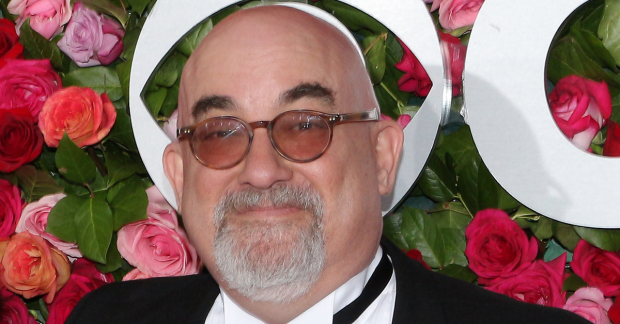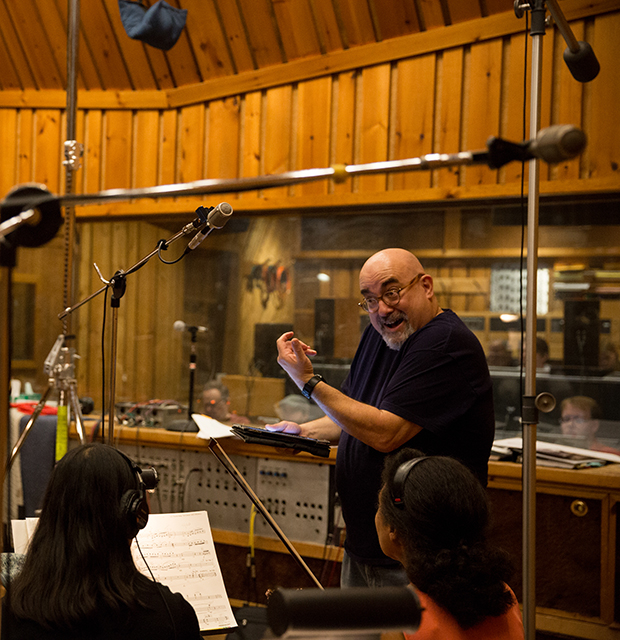Interview: Michael Starobin on the Art of Orchestrating and the Importance of Writing
For every performer that steps into the spotlight as the curtain rises, there are hundreds of people working behind the scenes to make the magic of theater real. From dressers to spot-ops, house managers to stage door attendants, and everything in between, it truly takes a village to put on a show. This is the second in a series of articles designed to introduce you to the many unique theater professions you might not realize exist.
Orchestrators are the people who are responsible for the way the music in a show sounds. Their ability to translate the composer's work, often created only on a piano, into instrumentation is a crucial step in bringing a show to life, and it is their inked score that survives after the original production, for future companies to study long after the composer is out of reach.
To speak about this critical profession is Michael Starobin, an immensely skilled orchestrator, conductor, composer, arranger, and music director, who has worked on 35 stage musicals, 10 beloved Disney films, and much more. His work can be heard this season in Flying Over Sunset.

(© David Gordon)
This conversation has been condensed and edited for clarity.
How would you describe the responsibilities of an orchestrator?
An orchestrator's job is to take the score as written by the composer, which is usually scored for just piano (occasionally guitar), and to put it into the instruments. Depending on the size of the band you're given, that could be anywhere from five pieces to nowadays 15 or 16. We used to go up to 25, but they no longer do that in the theater.
Your job is also to do some arranging. The composer probably wrote on piano. The score then fits a pianist's hands very well, but doesn't necessarily suit a violinist's hands, doesn't necessarily tell you what the drums should be, and so on. So you need to do a certain amount of arranging, which is kind of being assistant composer, where you take the material from the piano and you massage it so it's playable. Orchestration simply is adding instruments, but there's a good deal of massaging the music itself to make it work.
You were thrown in the deep end on Sunday in the Park with George, which was your Broadway debut.
Yeah, I was, but less so than what came after, because I was fairly ignorant of how deep the water was. If I had known then, I would have probably panicked a lot more than I did. I knew it was Broadway. I kind of knew who Stephen Sondheim was. My ignorance helped by preventing fear, and I just brought what I did to the table.
After Sunday, I got shows being thrown at me that were more commercial, more "standard Broadway," in quotation marks. I didn't know how to do those. I had to quickly learn what the sound of Broadway was, what was needed in dance music, how to write for a rhythm section in pop styles. I really needed to learn that stuff. I did Sunday in 1984 and it took me until about 1995 to really get my chops, the well-rounded abilities that a theater orchestrator needs.

(© Nathan Johnson)
I think your work on Assassins really shows how orchestration changes over a period of time. You worked on that score several times from 1991 to 2004.
Assassins is the opposite of many shows, which show you a style and create a world and stay in that world. Stephen made the choice to not write in a single style, instead trying to match the period of each assassin. The challenge there was to not make one sound, but to go to different worlds constantly.
The original Assassins was a workshop with three instruments. The next one was the one written for the record, which was 40 pieces – that wasn't usable onstage. I then did another where I reduced the 40 pieces to eight. That was just a reduction, and what I learned from doing that is reductions don't work. You have to start over and do a new orchestration. Find what fits the new production instead of trying to collapse down what you did before.
So when we came to the one for the Roundabout revival, I said "please don't use that eight piece version, it doesn't work, it's not good. Let me make a new one, with 14 pieces." It sounded fabulous in that space. One of my favorite things I did was with the trumpets, so that they weren't drowning out the singers. I had them play with their backs to the audience for the whole show until the moment JFK gets shot, then they would turn around, creating an explosion of sound. It's a good, practical trick.
What advice do you have for anyone who might want to look into being an orchestrator, or for any early career musician?
Start by being. In the theater, if you're a musician, work your way up to being the music director if possible and learn how the theater works. People who only orchestrate for the theater without having worked in a music department don't really get the mechanics. They may write beautiful orchestrations, but they're not really understanding dramatics and structure and character, the things you learn when you sit in the room, watching the director and actors. The first step to orchestrating for the theater is understanding theater. Read plays, read Shakespeare, learn those verbal rhythms. That contributes a lot to what I do.
You need to be able to take music you have never played and understand it. There is a lot to learn about harmonic analysis, of looking at music and seeing what the chord is. Your fingers should understand the music, not just a specific note. It also helps to be good at transposition.
Then you look for opportunities. Try to hook up with someone as unknown as you. For me, that was William Finn. No one knew him. He hadn't done a show yet, and we rose together. You don't just walk into the business as a kid and hook up with Sondheim. I did, so there is an exception to the rule, but don't expect that.
Don't be afraid to write music, poetry, drama. Get your head into writing, even if it's just a journal that is private. The habit of writing has to be developed. And once it's developed, it will bring so much joy to you and so much opportunity. One of the wonderful things about the arts is that so many people go to study it in school and get degrees, and only a fraction of them end up in the business.
All those others bring all those skills they learned in the theater about writing, about collaboration, about working under a deadline, they bring that to whatever world they end up in, whether it's business or government or medicine or anything. That's the skills that are invaluable.










